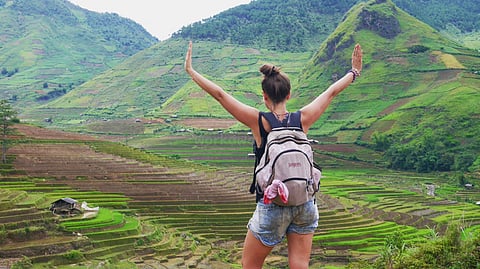
- LIFESTYLE
- FASHION
- FOOD
- ENTERTAINMENT
- EVENTS
- CULTURE
- VIDEOS
- WEB STORIES
- GALLERIES
- GADGETS
- CAR & BIKE
- SOCIETY
- TRAVEL
- NORTH EAST
- INDULGE CONNECT

Travelling solo as a woman in India can be an empowering and enriching experience, full of discovery and adventure. Travelling solo in India can be a transformative experience. With the right precautions and an adventurous spirit, it opens up a world of discovery and self-growth. Here, we share four inspiring stories and essential advice for women exploring India alone.
Anya, a solo traveller from the UK, embarked on a soul-searching journey through the Himalayas. From trekking in Spiti Valley to meditating in Rishikesh, Anya found serenity in the mountains. "The Himalayas taught me resilience and inner peace," she says. Her advice: “Always inform someone you trust about your whereabouts and plans. Local SIM cards with good coverage, like Jio or Airtel, are essential for staying connected.”
Priya, a food enthusiast from Mumbai, decided to explore India’s diverse culinary landscape. She travelled from Kerala to Kolkata, sampling local delicacies and attending cooking classes. Priya’s favorite memory is a cooking class in Jaipur where she learned to make traditional Rajasthani dishes. Her tip: “Join local cooking classes and food tours. They’re not only fun but also a safe way to explore the local culture and meet fellow travellers.”
Sarah, an Australian yoga instructor, journeyed to India to deepen her practice. She spent months in Rishikesh, the yoga capital of the world, and Varanasi, experiencing the spiritual heartbeat of India. “Practicing yoga by the Ganges was life-changing,” she recalls. Sarah’s advice: “Stay in well-reviewed ashrams or spiritual retreats. They offer a safe environment and an opportunity to meet like-minded individuals.”
Meera, a history buff from Delhi, set out to uncover India's rich heritage. Her solo trip included visits to Jaipur’s palaces, Hampi’s ruins, and the temples of Tamil Nadu. “Exploring India’s history alone gave me a profound connection to my roots,” she says. Meera’s tip: “Use reputable travel guides and apps like MakeMyTrip or TripAdvisor to plan your itinerary and accommodations. Opt for centrally located hotels with good security.”
Safety first: Always prioritise your safety. Avoid traveling at night, stay in reputable accommodations and keep emergency contacts handy.
Stay connected: Keep your phone charged and carry a power bank. Using apps like Google Maps and Uber can make navigation and transportation safer and easier.
Trust your instincts: If a situation doesn’t feel right, trust your gut and remove yourself immediately. It's better to be cautious than to regret later.
(Written by Sanjana Pulugurtha)